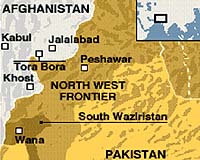| . |  |
. |
Kandahar, Afghanistan (AFP) Feb 3, 2011 Drugs, swearing and a sometimes insurmountable language barrier are just some of the cultural problems facing US troops striving to hand security to their Afghan counterparts by 2014. Americans are infuriated by Afghan soldiers smoking hashish while Afghans hate the often florid swearing of US troops, soldiers told AFP in the Zhari and Arghandab districts in Kandahar, southern Afghanistan. "(Swearing) creates big problems and irritates lots of people," complained Munawar, a 21-year-old Afghan soldier stationed in Zhari. "The worst is 'motherfucker' -- that creates a lot of tensions because the Americans often address us that way." A US sergeant, speaking on condition of anonymity, told how one day he was returning to his base and came under fire from an Afghan soldier high from smoking hashish. "We had a guy just next to him yelling at him to stop, but he just kept shooting like mad," the sergeant said. In a separate incident, witnessed by AFP, Lieutenant Andrew Frazier of 101st Airborne Division told off an armed Afghan soldier for smoking a joint while out on patrol. "Fuck you!" retorted the laughing soldier to his face. On his return to base, also in Zhari, Frazier spoke to the man's Afghan commander, complaining of "shitbag soldiers". The soldier was dismissed from the army. US-led NATO troops are under a deadline across Afghanistan to train local forces to take responsibility for their country's security by 2014. Their ability to do so is key to a plan to start limited international troop withdrawals from some parts of the country in July. With the two sides living side-by-side on remote and uncomfortable military bases, such tensions sometimes boil over with tragic consequences. Last month, a US Marine shot dead an Afghan policeman in southern Afghanistan whom he said had been threatening him. Three days later, an Italian soldier was killed and another injured in a shooting carried out by an Afghan soldier in the northwest. The biggest issue US troops in Kandahar -- a Taliban and drug heartland in the south -- have with their Afghan counterparts is their predilection for illegal substances, they say. Although drugs are banned in the Afghan National Army (ANA), many still take them, according to both sides. "If I don't, I fight with the other soldiers twice a day. It relaxes me," explained Munawar. But officials from both sides insist drug use is increasingly punished. "There is much more drug activity in the ANP (Afghan National Police) than in the ANA," said Lieutenant Colonel David Flynn, of the 101st Airborne. Other cross-cultural problems include a language barrier and different norms such as a more flexible interpretation of time-keeping, Flynn added. But many US soldiers advocate a tolerant attitude, with one pointing out that Afghan soldiers typically spend much longer on the front line than their US counterparts. "It's sometimes frustrating. They have huge logistical problems. They often talk on the cellphone when on patrol," said Captain Daniel Rowland, also from the 101st Airborne. "You must constantly keep in mind that an ANA soldier will be three to five years in a combat zone whereas we go back home after a year." Other Afghan soldiers also counsel mutual patience. "The Americans try to respect us and we them. They teach us lots of things -- how to use a radio, to organise a mission or a patrol," said Sergeant Khan Pacha, a veteran of five years. However, the differences between the two sides are highlighted at dinner times on military bases when Afghan and international soldiers typically sit at different tables. "Eat with the hajis (a slang word for Afghans)? I don't want to get sick," one American soldier said when asked about the division. Afghan soldiers are similarly reluctant to mix. "American food is horrible," said one troop. "And in any case, we couldn't understand them without an interpreter."
Share This Article With Planet Earth
Related Links News From Across The Stans
 Afghan war winnable without Pakistan help on border: US
Afghan war winnable without Pakistan help on border: USWashington (AFP) Feb 1, 2011 NATO-led forces can still win the war in Afghanistan even if Pakistan fails to move against militant havens on the border, a top US general said on Tuesday. "That's not a mission stopper in my mind," General David Rodriguez, deputy US commander in Afghanistan, told a Pentagon news conference. US officials have long pressed Islamabad to crack down on the Haqqani network and other militant ... read more |
|
| The content herein, unless otherwise known to be public domain, are Copyright 1995-2010 - SpaceDaily. AFP and UPI Wire Stories are copyright Agence France-Presse and United Press International. ESA Portal Reports are copyright European Space Agency. All NASA sourced material is public domain. Additional copyrights may apply in whole or part to other bona fide parties. Advertising does not imply endorsement,agreement or approval of any opinions, statements or information provided by SpaceDaily on any Web page published or hosted by SpaceDaily. Privacy Statement |